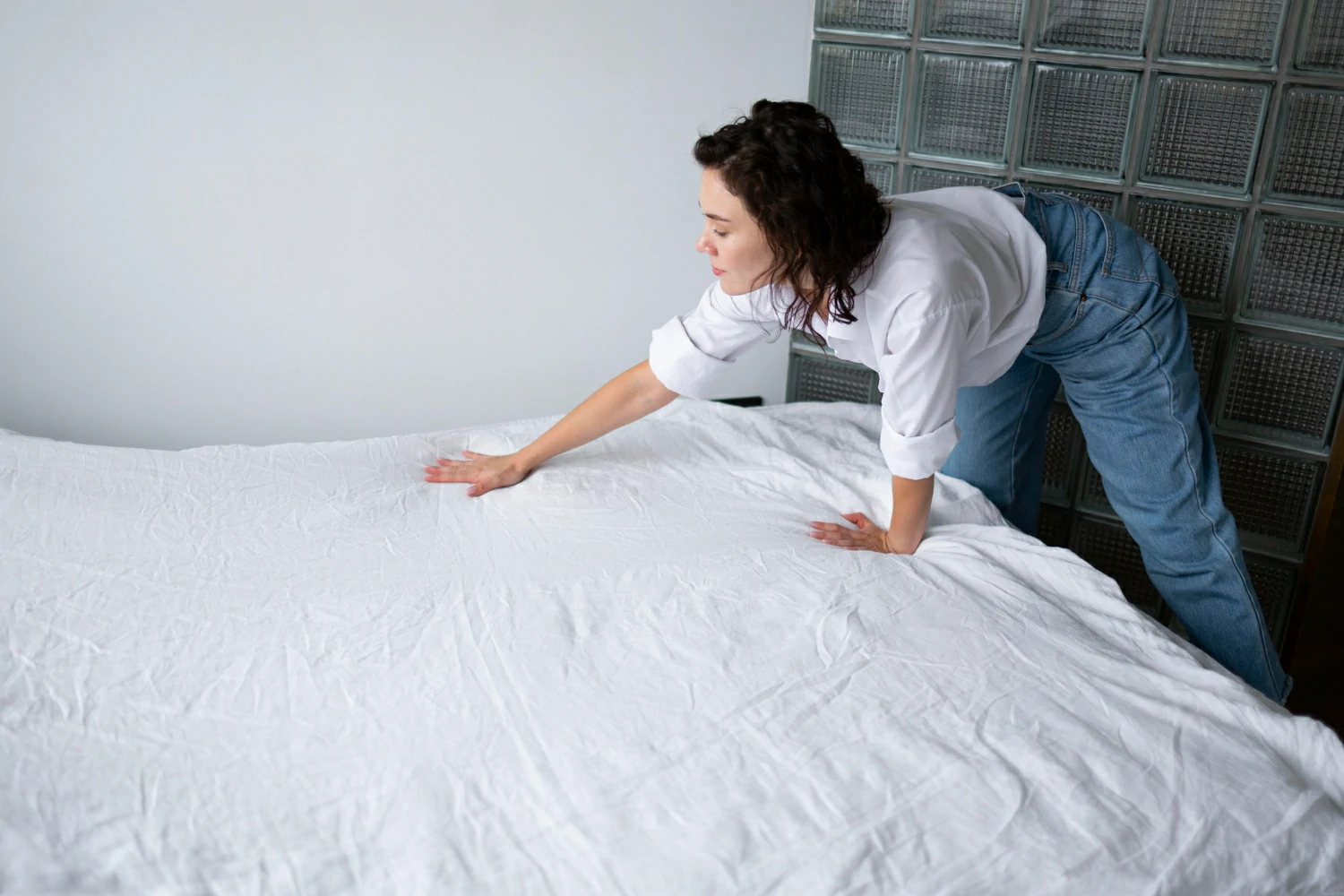Why are hotel mattresses so comfortable? Answer is – Hotel mattresses are often incredibly comfortable due to a combination of factors. They tend to be high-quality, often hybrid or memory foam, designed for optimal support and pressure relief. Hotels also use plush mattress toppers, soft, high-thread-count sheets, fluffy pillows, and duvets to enhance the overall sleep experience. The ambiance of the room, with its dim lighting and quiet atmosphere, further contributes to a restful night’s sleep.
Summary
- Quality Mattresses: Hotels invest in top-tier mattresses, often hybrid or memory foam, for superior comfort and support.
- Luxurious Bedding: Plush mattress toppers, soft sheets with high thread counts, fluffy pillows, and duvets elevate the coziness.
- Serene Environment: Dim lighting, quiet atmosphere, and temperature control create a tranquil sleep haven.
- Regular Maintenance: Hotels frequently clean, rotate, and replace mattresses to ensure optimal comfort.
- Psychological Factors: The novelty and escape of a hotel stay can enhance the perceived comfort of the bed.
Why are hotel mattresses so comfortable?

There’s an undeniable allure to hotel beds. After a long day of travel or exploration, sinking into the plush embrace of a hotel bed feels like entering a sanctuary of comfort and relaxation. But what is it that makes these beds so irresistibly inviting? And what can we learn from them to enhance our own sleep experiences at home?
The answer lies in a combination of carefully curated elements, ranging from the quality of the mattress and bedding to the ambiance of the room itself. Hotels invest heavily in creating the optimal sleep environment, recognizing that a good night’s rest is crucial for their guests’ overall satisfaction.
The Science Behind a Good Night’s Sleep
Sleep is a fundamental physiological process essential for our physical and mental well-being. During sleep, our bodies repair and restore themselves, consolidate memories, and regulate hormones.
A lack of quality sleep can lead to a host of health problems, including fatigue, impaired cognitive function, and increased risk of chronic diseases.
The science of sleep reveals that several factors influence our ability to get a restful night’s sleep. These include:
- The sleep environment: A dark, quiet, and cool room is ideal for promoting sleep.
- The bed and bedding: A comfortable mattress and supportive pillows are essential for a good night’s rest.
- Sleep hygiene: Establishing a regular sleep schedule, avoiding caffeine and alcohol before bed, and winding down with relaxing activities can improve sleep quality.
Hotels excel at creating sleep environments that cater to these factors. They often use high-quality mattresses, luxurious bedding, and soundproofing to minimize disturbances. They also offer amenities like blackout curtains, white noise machines, and temperature control to further enhance the sleep experience.
Dr. Rebecca Robbins Expert Opinion
According to Dr. Rebecca Robbins, a sleep researcher at Harvard Medical School, “The hotel environment is designed to be a haven for sleep. It’s dark, quiet, and there are no distractions. This can be very beneficial for people who have trouble sleeping at home.”
The Anatomy of a Comfortable Hotel Mattress
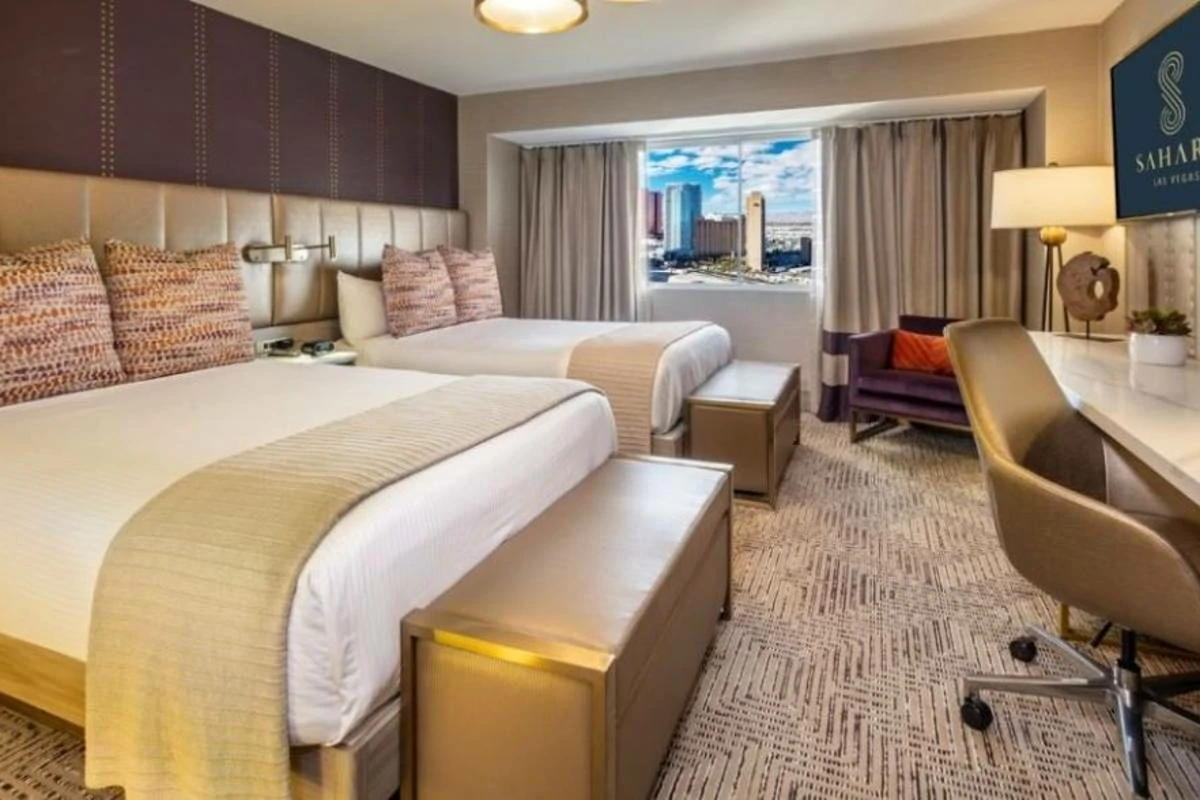
The mattress is the foundation of a good night’s sleep, and hotels understand this better than anyone.
They invest in top-notch mattresses designed to provide optimal support and pressure relief, ensuring their guests wake up feeling refreshed and rejuvenated.
But what exactly goes into making a hotel mattress so comfortable? Let’s break down the anatomy of these sleep havens.
1. Hybrid vs. Memory Foam: Pros and Cons
Hotel mattresses often fall into two main categories: hybrid and memory foam. Each type has its own unique benefits and drawbacks:
Hybrid Mattresses
Hybrid mattresses combine the best of both worlds: the support of innerspring coils and the comfort of foam layers.
This combination provides excellent pressure relief, contouring to the body’s shape while maintaining proper spinal alignment.
Hybrid mattresses are also known for their breathability, making them a good choice for those who tend to sleep hot.
- Pros: Excellent support, pressure relief, breathability
- Cons: Can be more expensive than other types of mattresses
Memory Foam Mattresses
Memory foam mattresses are known for their exceptional pressure relief and body-hugging comfort. They mold to the body’s contours, evenly distributing weight and reducing pressure points.
This can be particularly beneficial for those with back or joint pain. Memory foam mattresses also tend to isolate motion well, minimizing sleep disturbances caused by a partner’s movements.
- Pros: Exceptional pressure relief, body-hugging comfort, motion isolation
- Cons: Can trap heat, may have a slight initial odor
Michael Breus Expert Opinion
According to Michael Breus, Ph.D., a clinical psychologist and sleep specialist, “Hybrid mattresses offer a great balance of support and comfort, making them a good choice for many people. Memory foam mattresses are ideal for those who want maximum pressure relief.”
2. The Role of Mattress Toppers
To further enhance the comfort of their mattresses, hotels often use mattress toppers.
These additional layers of padding can be made from a variety of materials, including memory foam, feather, and down.
Mattress toppers provide extra cushioning and support, making the bed feel even more luxurious and inviting.
3. The Importance of Support and Pressure Relief
Whether it’s a hybrid or memory foam mattress, the most important factors in a comfortable hotel bed are support and pressure relief.
A supportive mattress helps maintain proper spinal alignment, preventing back pain and discomfort.
Pressure relief is essential for reducing stress on the body’s pressure points, such as the hips and shoulders, allowing for a deeper, more restful sleep.
Hotels prioritize these factors by investing in high-quality mattresses with the right balance of support and comfort. They also regularly maintain their mattresses, ensuring they are in top condition for their guests.
Beyond the Mattress: The Bedding Ensemble
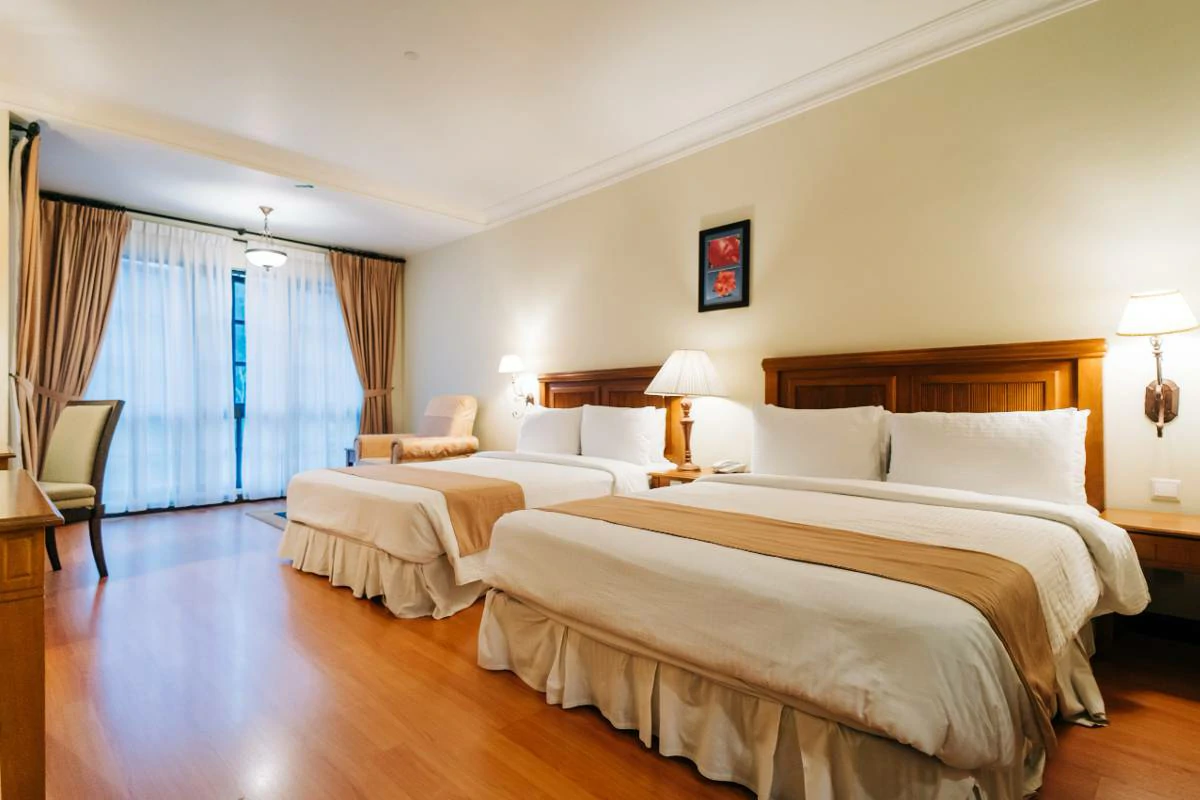
While the mattress forms the foundation of a comfortable bed, the bedding ensemble plays a crucial role in elevating the sleep experience to a whole new level of luxury.
Hotels understand this well, meticulously curating every element from the sheets to the pillows and duvet to create a haven of comfort and relaxation.
1. Thread Count: Does It Really Matter?
Thread count refers to the number of threads woven into one square inch of fabric. It’s often touted as a key indicator of sheet quality, with higher thread counts supposedly equating to softer, more luxurious sheets. However, the reality is more nuanced.
While thread count can contribute to the feel of sheets, it’s not the sole determinant of quality. Other factors, such as the type of fiber, weave, and finishing, also play a significant role. For instance, high-quality long-staple cotton fibers will feel softer and more durable than shorter fibers, regardless of the thread count.
So, does thread count matter? Yes, but it’s not the be-all and end-all. A good rule of thumb is to look for sheets with a thread count between 200 and 800, made from high-quality materials like Egyptian or Supima cotton.
Julian Tomchin Expert Opinion
According to textile expert Julian Tomchin, “Thread count is only one factor in determining sheet quality. The type of fiber, weave, and finishing are equally important.”
He recommends focusing on the overall feel and durability of the sheets rather than solely on the thread count. .
2. Pillow Talk: Finding the Perfect Pillow
Pillows are a personal preference, but hotels aim to cater to a wide range of sleepers by offering various pillow options. Some common types include:
- Down pillows: Known for their softness and fluffiness, down pillows are filled with the soft undercoating of ducks or geese. They offer excellent support and conform to the shape of your head and neck.
- Feather pillows: Similar to down pillows, feather pillows are filled with the larger feathers of birds. They are slightly firmer than down pillows and offer good support.
- Memory foam pillows: These pillows conform to the shape of your head and neck, providing excellent support and pressure relief. They area good choice for those who prefer a firmer pillow.
- Synthetic pillows: Filled with polyester or other synthetic materials, these pillows are a good option for those with allergies. They are often less expensive than down or feather pillows.
When choosing a pillow, consider your sleeping position and personal preferences. Side sleepers generally need a thicker pillow to keep their spine aligned, while back sleepers may prefer a medium-thickness pillow. Stomach sleepers typically need a thin pillow to avoid neck strain.
3. The Duvet Dilemma: Down vs. Synthetic
The duvet is the final layer of the bedding ensemble, providing warmth and comfort. Hotels often offer both down and synthetic duvets to cater to different preferences and needs.
- Down duvets: Filled with the soft undercoating of ducks or geese, down duvets are incredibly warm and lightweight. They offer excellent insulation and breathability.
- Synthetic duvets: Filled with polyester or other synthetic materials, synthetic duvets are a good option for those with allergies. They are also easier to care for than down duvets.
The choice between down and synthetic often comes down to personal preference and budget. Down duvets are generally more expensive but offer superior warmth and comfort. Synthetic duvets are a more affordable option and can be just as warm and comfortable.
The Hotel Room Environment
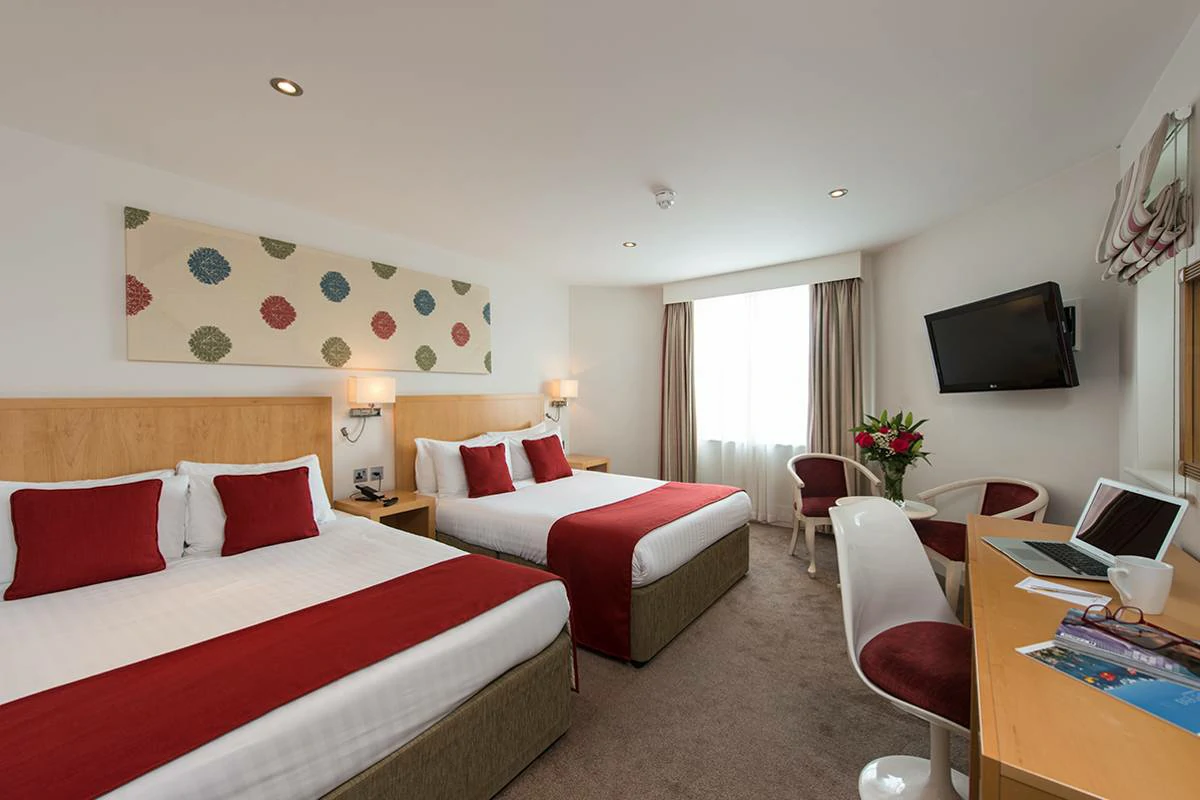
While a comfortable bed and luxurious bedding are essential for a good night’s rest, the hotel room environment plays a significant role in creating the ultimate sleep sanctuary.
Hotels go to great lengths to optimize lighting, noise control, and temperature, ensuring guests can unwind and drift off to sleep effortlessly. Let’s delve into the key elements that contribute to the serene ambiance of a hotel room.
1. Lighting: Setting the Mood for Sleep
Lighting is a crucial aspect of sleep hygiene. Exposure to bright light, especially blue light emitted from electronic devices, can suppress the production of melatonin, the hormone that regulates sleep. Hotels understand this and take measures to create a sleep-conducive environment.
- Blackout Curtains: Many hotels use blackout curtains to block out external light sources, creating a pitch-dark environment that promotes melatonin production and deep sleep.
- Dimmable Lights: Dimmable lights allow guests to adjust the light levels according to their preference, creating a relaxing and soothing atmosphere.
- Warm Lighting: Hotels often use warm-toned light bulbs, which emit less blue light than cool-toned bulbs, making them more conducive to sleep.
2. Noise Control: Creating a Peaceful Oasis
Noise pollution can disrupt sleep and lead to fatigue and irritability. Hotels employ various strategies to minimize noise and create a tranquil oasis for their guests.
- Soundproofing: Many hotels invest in soundproofing materials to reduce noise from external sources like traffic and neighboring rooms.
- White Noise Machines: Some hotels provide white noise machines to mask disruptive sounds and create a consistent background noise that promotes relaxation and sleep.
- Quiet Hours: Hotels may enforce quiet hours during which guests are asked to keep noise levels down, ensuring a peaceful environment for everyone.
3. Temperature: Finding the Sweet Spot
Temperature plays a crucial role in sleep quality. A cool room temperature, typically between 60 and 67 degrees Fahrenheit (15.5 and 19.4 degrees Celsius), is considered ideal for sleep.
Hotels often have central air conditioning and heating systems to maintain a comfortable temperature throughout the night.
- Individual Controls: Many hotels also offer individual climate controls in each room, allowing guests to adjust the temperature to their liking.
- Breathable Bedding: Hotels use breathable bedding materials, such as cotton and linen, to prevent guests from getting too hot during the night.
Dr. Chris Winter Expert Opinion
According to sleep expert Dr. Chris Winter, “The ideal sleep environment is cool, dark, and quiet. These conditions help promote relaxation and allow the body to fall into a deep, restorative sleep.”
The Psychology of Sleep
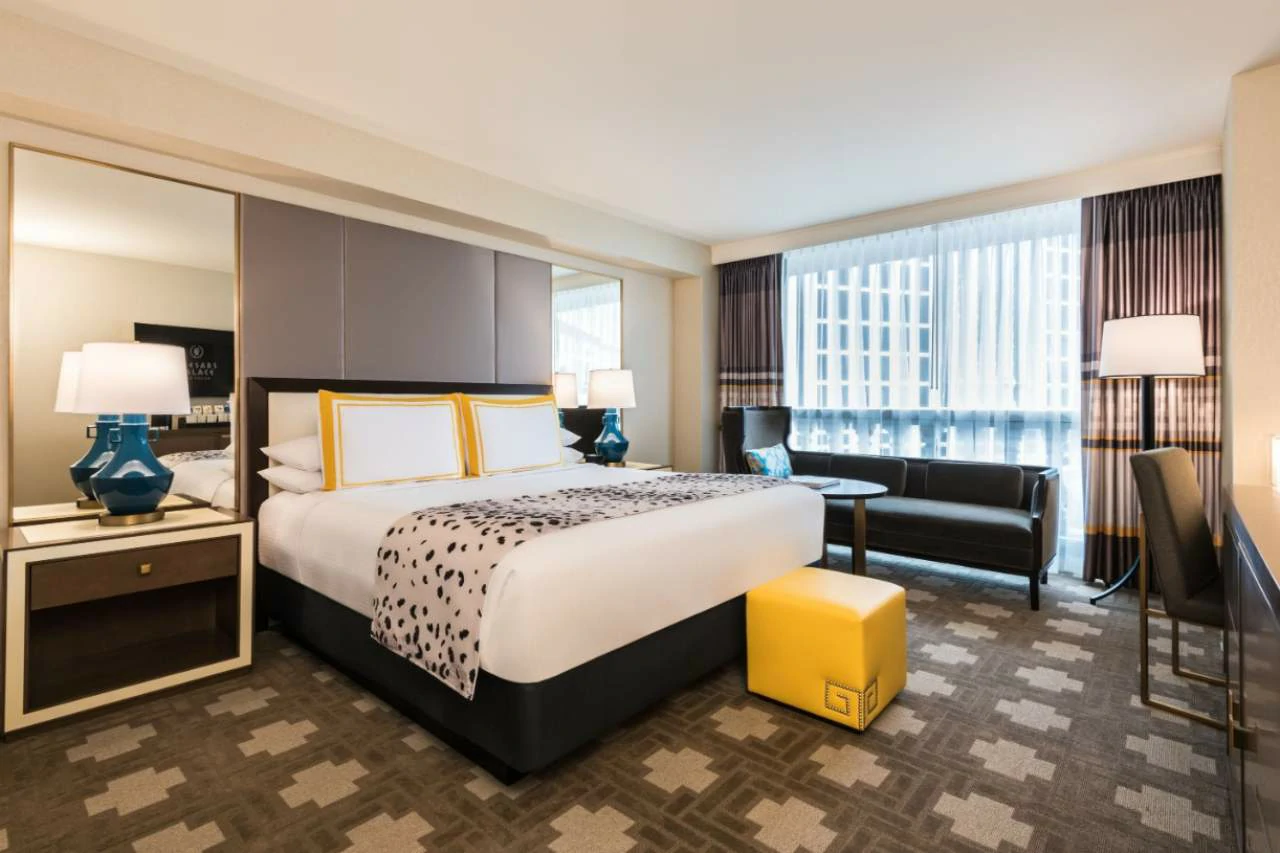
Beyond the physical comforts of a hotel room, there are psychological factors that significantly contribute to the exceptional sleep experienced by many guests.
The novelty of a new environment, the stress-reducing effects of a getaway, and the power of expectation all play a role in creating a sleep experience that often surpasses that of our own beds at home.
1. The Novelty Factor: Escaping the Routine
One of the key reasons why we tend to sleep better in hotels is the simple change of scenery. Breaking away from our daily routines and familiar surroundings can have a profound impact on our sleep.
- Mental Reset: A new environment allows us to mentally disengage from our daily stresses and worries, promoting relaxation and preparing our minds for sleep.
- Novelty-Induced Excitement: The excitement of exploring a new place and the anticipation of a comfortable bed can create a positive emotional state conducive to sleep.
2. Stress Reduction: The Benefits of a Getaway
Hotels, especially those designed for relaxation and wellness, often offer amenities and services that promote stress reduction.
From spas and massages to yoga classes and nature walks, these activities can help guests unwind and de-stress, preparing their bodies and minds for a restful night’s sleep.
- Stress Hormones: Stress triggers the release of cortisol, a hormone that can interfere with sleep. Relaxing activities can help lower cortisol levels, making it easier to fall asleep and stay asleep.
- Mindfulness: Many hotels offer mindfulness programs, such as meditation and yoga, which can help guests cultivate a sense of calm and reduce anxiety, both of which are beneficial for sleep.
3. The Placebo Effect: The Power of Expectation
The mere expectation of a good night’s sleep can influence our actual sleep quality. When we check into a hotel, we often anticipate a luxurious and restful experience. This anticipation can create a positive mindset that sets the stage for a good night’s sleep.
- Positive Associations: We often associate hotels with relaxation and indulgence, and these positive associations can influence our perception of the sleep experience.
- Self-Fulfilling Prophecy: If we believe we are going to sleep well, we are more likely to do so. This is known as the placebo effect, and it can have a powerful impact on our sleep quality.
Dr. Colleen Carney Expert Opinion
According to Dr. Colleen Carney, a sleep psychologist and director of the Sleep and Depression Laboratory at Ryerson University, “Expectations can play a significant role in our sleep experience. If we believe we are going to sleep well, we are more likely to do so.”
Bringing the Hotel Experience Home
While the allure of hotel beds is undeniable, you don’t have to check into a five-star resort every night to experience a luxurious and restful sleep.
By incorporating some of the key elements of a hotel sleep environment into your own bedroom, you can create a personal sleep sanctuary that rivals even the most opulent hotel suites.
1. Investing in a Quality Mattress
The mattress is the cornerstone of any comfortable bed. Hotels invest in high-quality mattresses designed to provide optimal support and pressure relief, ensuring their guests wake up feeling refreshed and rejuvenated.
When choosing a mattress for your home, consider the following factors:
- Your sleep position: Side sleepers generally need a softer mattress for pressure relief, while back and stomach sleepers may prefer a firmer mattress for spinal alignment.
- Your body type: Heavier individuals may need a firmer mattress for proper support, while lighter individuals may prefer a softer mattress for comfort.
- Your personal preferences: Consider whether you prefer a traditional innerspring mattress, a memory foam mattress, a hybrid mattress, or another type.
It’s also a good idea to test out different mattresses before making a purchase. Many mattress retailers offer trial periods, allowing you to sleep on the mattress for a few weeks and return it if it’s not a good fit.
2. Upgrading Your Bedding
The bedding you choose can significantly impact your sleep comfort. Hotels typically use high-quality sheets, pillows, and duvets made from natural materials like cotton, linen, and down.
These materials are breathable and moisture-wicking, helping to regulate body temperature and prevent night sweats.
When choosing bedding for your home, look for:
- High-quality materials: Opt for natural fibers like cotton, linen, or bamboo, which are soft, breathable, and durable.
- Appropriate thread count: A thread count between 200 and 800 is usually a good indicator of quality sheets.
- Pillows that suit your sleeping position: Choose pillows that provide adequate support and keep your spine aligned.
- A duvet that’s the right weight for your climate: A down or down alternative duvet is a good choice for colder climates, while a lighter duvet may be more suitable for warmer climates.
Ariel Kaye Expert Opinion
According to bedding expert Ariel Kaye, founder and CEO of Parachute Home, “Investing in high-quality bedding is one of the best things you can do for your sleep. It can make a huge difference in how comfortable and well-rested you feel.”
3. Creating a Sleep-Conducive Environment
In addition to investing in a quality mattress and bedding, you can also create a more sleep-conducive environment in your bedroom by:
- Blocking out light: Use blackout curtains or an eye mask to create a dark and restful sleep environment.
- Minimizing noise: Use earplugs or a white noise machine to block out disruptive sounds.
- Keeping the room cool: The ideal temperature for sleep is between 60 and 67 degrees Fahrenheit (15.5 and 19.4 degrees Celsius).
- Establishing a relaxing bedtime routine: Avoid screens for at least an hour before bed, take a warm bath, read a book, or listen to calming music to wind down.
Case Studies: Renowned Hotel Beds

Certain hotel chains have become synonymous with exceptional sleep experiences, thanks to their signature beds.
These beds are meticulously designed and crafted, often in collaboration with leading mattress manufacturers and sleep experts, to provide guests with the ultimate comfort and support.
Let’s take a closer look at three of the most renowned hotel beds in the industry.
1. The Heavenly Bed by Westin
The Westin Heavenly Bed is perhaps the most iconic hotel bed in the world. Introduced in 1999, it revolutionized the hotel industry by setting a new standard for sleep comfort.
The Heavenly Bed features a custom-designed Simmons Beautyrest® mattress with a plush pillow-top, a crisp white duvet, five fluffy pillows, and high-quality sheets.
- The Mattress: The mattress is specifically designed for the Heavenly Bed, offering a perfect balance of support and comfort. It features pocketed coil technology for motion isolation and a plush pillow-top for added cushioning.
- The Bedding: The bedding is made from high-quality materials, including a 250-thread-count cotton duvet cover and 100% Egyptian cotton sheets. The five pillows are a mix of down and feathers, providing luxurious comfort and support.
Personal Experience: I’ve had the pleasure of sleeping in a Westin Heavenly Bed on several occasions, and it truly lives up to its name. The mattress is incredibly comfortable, the bedding is luxurious, and the overall sleep experience is exceptional.
2. The Marriott Bed
The Marriott Bed is another iconic hotel bed that has earned a reputation for its comfort and quality. It features a custom-designed Sealy Posturepedic® mattress with a plush pillow-top, a down comforter, and crisp white linens.
- The Mattress: The mattress is designed to provide optimal support and pressure relief, ensuring a restful night’s sleep. It features a pocketed coil system for motion isolation and a plush pillow-top for added comfort.
- The Bedding: The bedding is made from high-quality materials, including a 300-thread-count cotton duvet cover and 100% Egyptian cotton sheets. The down comforter is lightweight and breathable, providing warmth without overheating.
3. The Ritz-Carlton Bed
The Ritz-Carlton Bed is synonymous with luxury and indulgence. It features a custom-designed Stearns & Foster® mattress with a plush pillow-top, a featherbed, a down comforter, and high-thread-count Frette linens.
- The Mattress: The mattress is handcrafted with premium materials, including a pocketed coil system for motion isolation and a plush pillow-top for unparalleled comfort.
- The Bedding: The bedding is the epitome of luxury, with a 400-thread-count Frette duvet cover and 100% Egyptian cotton sheets. The featherbed adds an extra layer of cushioning, while the down comforter provides warmth and comfort.
The Ritz-Carlton Bed is often considered the gold standard of hotel beds, and it’s not hard to see why. The combination of premium materials, expert craftsmanship, and luxurious bedding creates a sleep experience that is truly unforgettable.
These are just a few examples of the renowned hotel beds that have set the bar for sleep comfort and luxury. By studying their design and construction, we can gain valuable insights into how to create a similar sleep haven in our own homes.
Whether you invest in a high-quality mattress, upgrade your bedding, or simply create a more relaxing sleep environment, taking inspiration from these iconic hotel beds can help you achieve the ultimate sleep experience.
Maintenance Matters: Keeping Your Mattress Comfortable
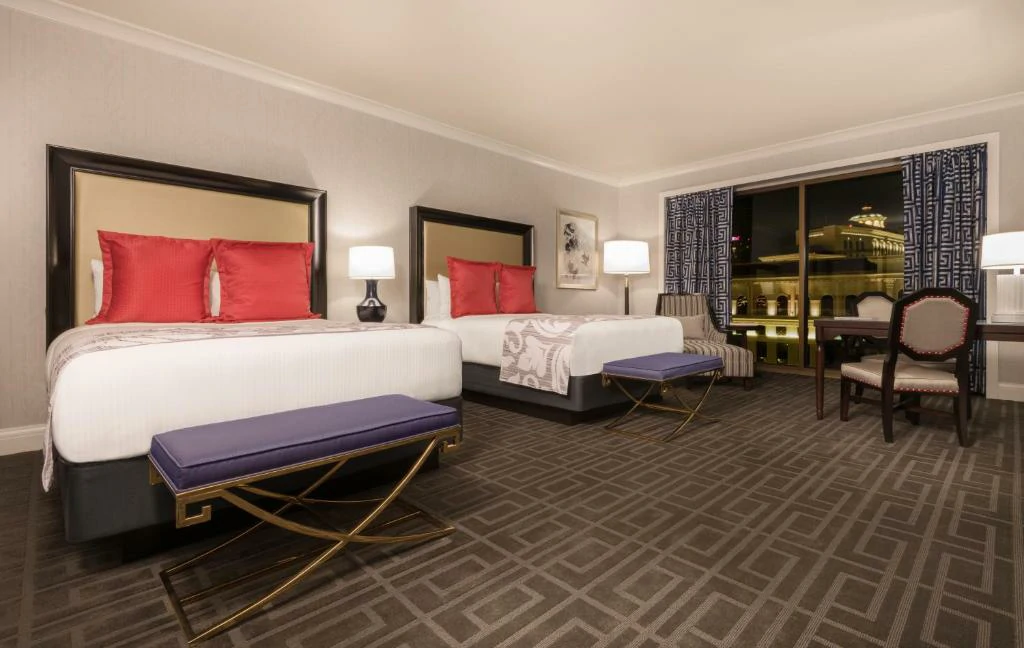
Investing in a high-quality mattress is a significant step towards better sleep, but it’s equally important to maintain it properly to ensure its longevity and continued comfort.
Just like any other investment, your mattress requires regular care and attention to stay in top shape.
Let’s explore some essential maintenance practices that can help you keep your mattress feeling as good as new for years to come.
1. Cleaning and Hygiene
Maintaining a clean mattress is crucial for hygiene and overall sleep quality. Sweat, dead skin cells, dust mites, and other allergens can accumulate over time, leading to unpleasant odors and potential health issues. Regular cleaning can help prevent these problems.
- Vacuuming: Vacuum your mattress every few months to remove dust, dirt, and other debris. Use the upholstery attachment and go over the entire surface, paying extra attention to the seams and crevices.
- Spot Cleaning: Immediately address spills and stains with a mild detergent and water solution. Blot the stain gently with a clean cloth, avoiding excessive rubbing, which can damage the fabric.
- Air Out: Occasionally, remove all bedding and let your mattress air out for a few hours. This helps to remove moisture and odors.
- Mattress Protector: Consider using a mattress protector to shield your mattress from spills, stains, and dust mites. This can significantly extend the lifespan of your mattress.
Carolyn Forte Expert Opinion
According to Carolyn Forte, Director of the Home Appliances and Cleaning Products Labs at the Good Housekeeping Institute, “Regular cleaning and maintenance can help prevent mattress wear and tear, extending its lifespan and ensuring you get the most out of your investment.”
2. Rotating and Flipping
Rotating and flipping your mattress can help to distribute wear and tear evenly, preventing sagging and indentations.
Most mattresses should be rotated 180 degrees every few months, while some models can also be flipped over. Consult your mattress manufacturer’s instructions for specific recommendations.
3. When to Replace Your Mattress
Even with proper care, mattresses don’t last forever. Over time, they lose their support and comfort, which can negatively impact your sleep quality. Here are some signs that it’s time to replace your mattress:
- Visible Sagging or Indentations: If your mattress shows visible signs of wear and tear, such as sagging or indentations, it’s likely time for a replacement.
- Increased Allergies or Discomfort: If you wake up with allergy symptoms or aches and pains that weren’t there before, your mattress could be the culprit.
- Age: Most mattresses have a lifespan of 7-10 years. If your mattress is older than that, it may be time to consider a new one.
Expert Opinions: What the Sleep Professionals Say
To truly understand the secrets behind the unparalleled comfort of hotel beds, we turn to the experts who dedicate their careers to crafting the ultimate sleep experience.
Hotel managers, mattress manufacturers, and sleep specialists offer invaluable insights into the meticulous attention to detail and scientific principles that go into creating a haven of rest and rejuvenation.
1. Hotel Managers
Hotel managers are the architects of the entire guest experience, and sleep is a crucial component. They emphasize the importance of creating a holistic sleep environment that extends beyond the bed itself.
“We pay close attention to every detail, from the quality of the linens to the lighting and temperature control in the room,” says Sarah Johnson, General Manager of The Ritz-Carlton, New York. “We want our guests to feel pampered and relaxed from the moment they step into their room.”
Johnson also highlights the importance of staff training in providing a seamless sleep experience. “Our staff is trained to anticipate our guests’ needs and ensure their comfort throughout their stay. We want them to feel like they’re sleeping in their own private sanctuary.”
2. Mattress Manufacturers
Mattress manufacturers are at the forefront of sleep technology, constantly innovating to create products that deliver optimal support, comfort, and pressure relief.
“We work closely with sleep experts and conduct extensive research to develop mattresses that cater to a wide range of sleep needs,” says Serta Simmons Bedding President and CEO Shelley Huff. “We understand that a good night’s sleep is essential for overall health and well-being, and we strive to provide our customers with the best possible sleep experience.”
3. Sleep Experts
Sleep experts offer valuable insights into the science of sleep and the factors that contribute to a good night’s rest.
“A comfortable bed is just one piece of the puzzle,” says Dr. Michael Breus, a clinical psychologist and sleep specialist. “Other factors, such as the sleep environment, sleep hygiene, and stress levels, also play a significant role in sleep quality.”
Dr. Breus emphasizes the importance of establishing a consistent sleep routine and creating a relaxing bedtime ritual. “Winding down before bed with calming activities, such as reading or taking a warm bath, can help signal to your body that it’s time to sleep.”
FAQs
1. Why do I sleep better in hotels?
The answer lies in a combination of factors:
- Novelty: The change of scenery and escape from routine can help you relax and de-stress, making it easier to fall asleep.
- Comfort: Hotel beds are often designed with high-quality mattresses and luxurious bedding, providing optimal support and comfort.
- Environment: Hotels prioritize creating a sleep-conducive environment with features like blackout curtains, soundproofing, and temperature control.
- Psychology: The anticipation of a good night’s sleep and the positive associations we have with hotels can also influence our sleep quality.
2. Can I buy the same mattress as my favorite hotel?
Yes, many hotels offer their signature beds for purchase through their websites or retail partners. For example, you can buy the Westin Heavenly Bed, the Marriott Bed, and the Ritz-Carlton Bed online.
3. How often should I replace my mattress?
The general recommendation is to replace your mattress every 7-10 years. However, this can vary depending on the quality of the mattress, how well you maintain it, and your individual sleep needs.
4. What are some tips for improving my sleep at home?
Here are a few tips:
- Invest in a quality mattress and bedding: This is the foundation of a good night’s sleep.
- Create a sleep-conducive environment: Keep your bedroom cool, dark, and quiet.
- Establish a consistent sleep routine: Go to bed and wake up at the same time each day, even on weekends.
- Avoid caffeine and alcohol before bed: These substances can interfere with sleep.
- Wind down before bed: Relax with a warm bath, reading, or meditation.
5. Are hotel mattresses really that much better than regular mattresses?
Hotel mattresses are often made with higher-quality materials and construction than standard mattresses. They are also designed to withstand heavy use and provide consistent comfort for a variety of sleepers. However, with the right research and investment, you can find a mattress for your home that offers similar levels of comfort and support.
The Bottom Line
The allure of hotel beds isn’t just a marketing gimmick—it’s a carefully orchestrated symphony of comfort, support, and tranquility. From the mattress and bedding to the room environment and psychological factors, every element is meticulously designed to create the ultimate sleep experience.
While you might not be able to replicate every aspect of a luxury hotel room at home, you can certainly borrow some of their secrets to elevate your own sleep sanctuary.
By investing in a quality mattress, upgrading your bedding, and optimizing your sleep environment, you can significantly enhance your sleep quality and wake up feeling refreshed and rejuvenated every day.
